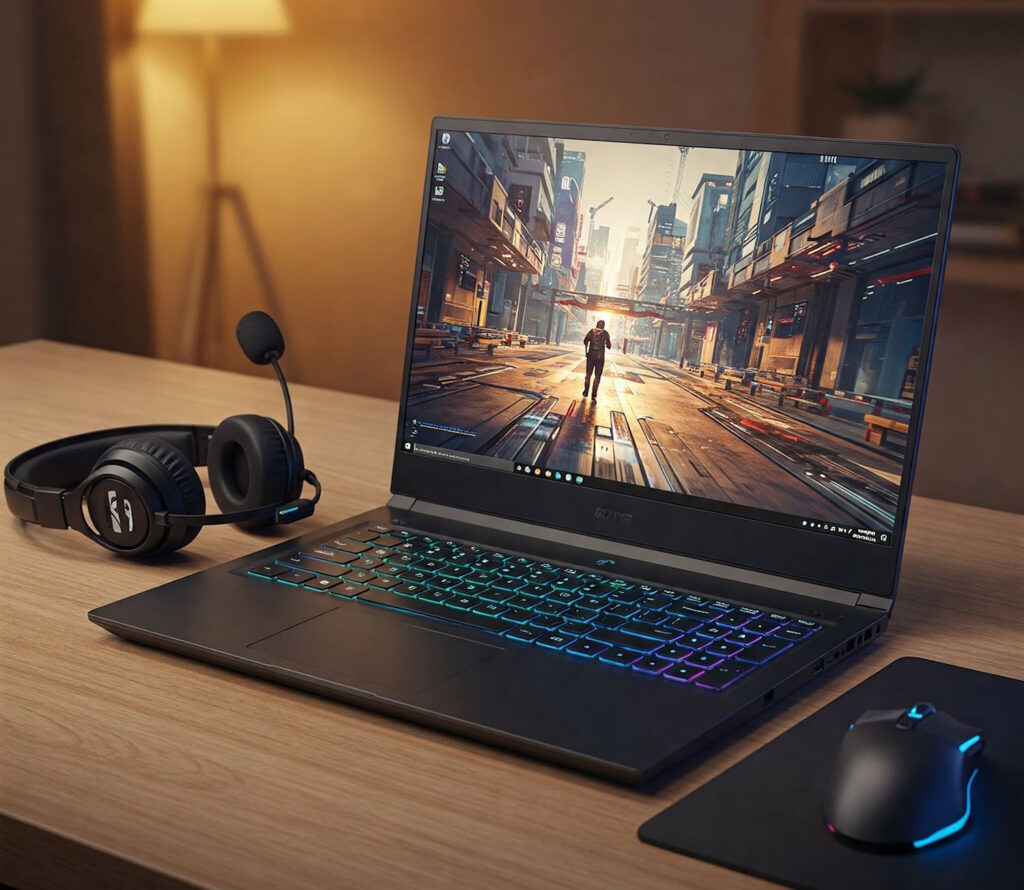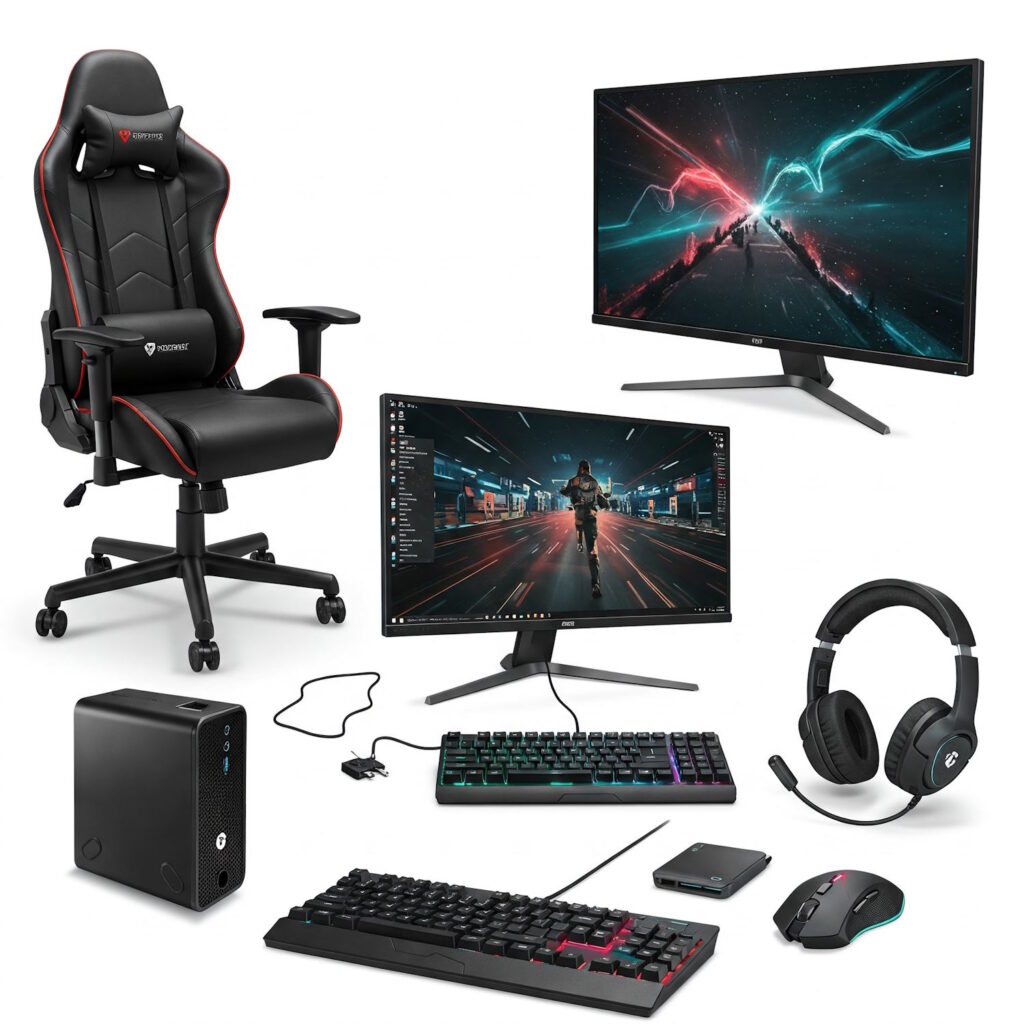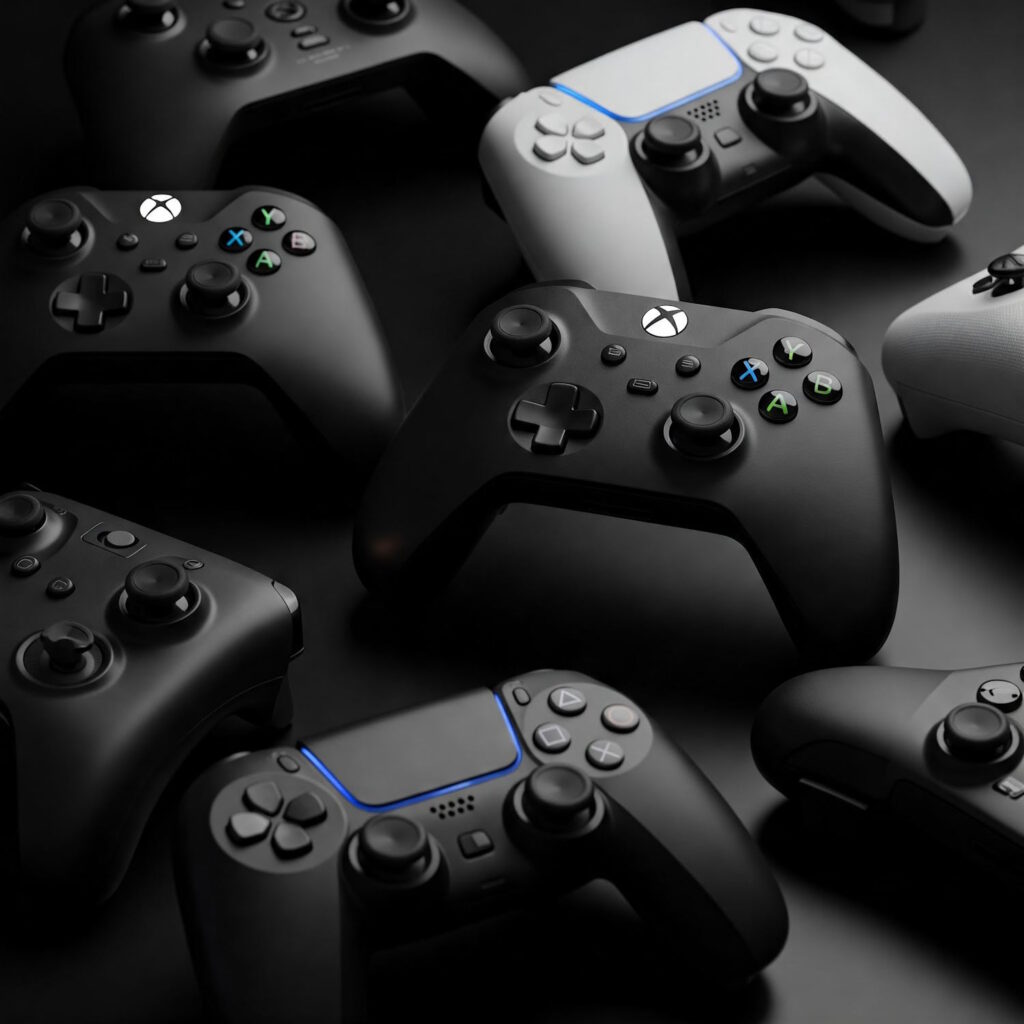Introduction to Gaming Laptops
Gaming laptops have emerged as a specialized category of portable computing devices, designed specifically to meet the requirements of video gaming. Unlike standard laptops, which are generally optimized for tasks such as word processing and web browsing, gaming laptops incorporate advanced graphics cards, high-performance processors, enhanced cooling systems, and displays with higher refresh rates. These features collectively allow for a better gaming experience and significantly contribute to the device’s longevity and overall performance during intensive gaming sessions.
The increasing popularity of gaming laptops can be attributed to various factors. In today’s fast-paced world, the desire for mobility and convenience has prompted many gamers to seek reliable alternatives to traditional desktop setups. Gaming laptops offer a solution, allowing enthusiasts to enjoy their favorite titles while on the move, whether at a friend’s house or during travel. Additionally, modern advancements in technology have made it feasible to pack powerful hardware into a more compact form factor, enhancing the appeal of gaming laptops to a wider audience.
Moreover, the gaming community has been instrumental in popularizing mobile gaming solutions, further solidifying the position of gaming laptops in the market. Online gaming, eSports, and the demand for high-quality graphics have increased the need for hardware capable of supporting these activities. As such, many manufacturers have dedicated resources to the development of gaming laptops, providing users with options that cater to various budgets and performance needs. This evolution in gaming technology signifies a growing recognition that gaming can extend beyond the traditional desktop setup, supporting a lifestyle that values flexibility and portability without sacrificing performance.
Key Features of Gaming Laptops
When considering the purchase of a gaming laptop, it is vital to understand the essential features that distinguish these machines from standard laptops. Among the most critical components is the graphics card, or GPU, which plays a significant role in delivering high-quality visuals and smooth frame rates during gameplay. High-performance GPUs—such as those from the NVIDIA GeForce RTX series—allow gamers to enjoy the latest titles with superior graphics settings and better rendering capabilities.
Equally important is the processor, or CPU. A powerful CPU ensures that the gaming laptop can efficiently handle complex calculations and multitasking, making it vital for modern gaming experiences. Processors like the Intel Core i7 or AMD Ryzen 7 series are typically preferred, as they offer ample performance to keep up with demanding gaming software. Coupled with the CPU, sufficient RAM is essential for optimal gaming performance. Most gaming laptops come equipped with at least 16GB of RAM, allowing them to manage multiple applications and processes seamlessly.
Cooling systems are another critical aspect of gaming laptops. Intensive gaming sessions generate considerable heat, making effective cooling mechanisms essential to preventing thermal throttling. High-end gaming laptops often feature advanced cooling technologies, including multiple fans and heat pipes, to maintain optimal performance and extend the lifespan of internal components.
Finally, the display quality significantly impacts the gaming experience. Features such as refresh rates, response times, and resolution contribute to how immersive a game feels. Gaming laptops typically offer high refresh rates (144Hz or higher) and minimal response times to ensure smooth gameplay and reduce motion blur. Together, these features facilitate a competitive edge and enhance the overall enjoyment of gaming.
Benefits of Using a Gaming Laptop
Gaming laptops have increasingly gained popularity among users seeking high-performance machines that are also portable. One of the primary advantages of a gaming laptop is its portability. Unlike traditional desktop gaming systems, which require a dedicated space to set up, gaming laptops can be easily transported. This feature appeals to gamers who attend LAN parties, travel frequently, or simply want the flexibility to game in various environments, whether at home, in a cafe, or during commutes.
Convenience is another significant benefit offered by gaming laptops. Equipped with powerful CPUs and GPUs, modern gaming laptops can run high-demand games without a hitch. They come pre-installed with essential software and often have longer battery life compared to previous generations. This allows users to immerse themselves in their gaming experiences without the constant need for a power source. Moreover, gaming laptops usually come with built-in screens, keyboards, and trackpads, negating the necessity for additional peripherals, which further enhances their user-friendliness.
Versatility is yet another compelling advantage. Gaming laptops are not just tailored for gamers; they are also excellent for professionals and students who require robust systems for tasks like graphic design, video editing, or software development. The processing power of gaming laptops often exceeds that of standard laptops, making them highly efficient for multitasking and running demanding applications. This versatility combined with mobility makes gaming laptops an appealing choice for a wide range of users.
In comparison to desktop systems, gaming laptops provide a compact solution without compromising much on performance. While desktops may offer superior upgradeability and superior thermal management, gaming laptops stand out remarkably by combining powerful performance and portability, making them a worthy investment for many. Thus, those seeking a balance between efficiency and mobility may find a gaming laptop to be the ideal choice.
Potential Drawbacks of Gaming Laptops
While gaming laptops offer impressive performance and portability, they also come with several drawbacks that potential buyers should be aware of. One of the most significant concerns is the price; gaming laptops typically cost more than their desktop counterparts, given the need for compact components and advanced cooling systems. This higher price point may deter budget-conscious gamers who could achieve similar performance with a more economical desktop setup.
Another major factor to consider is thermal performance. Gaming laptops often struggle to maintain optimal temperatures during intense gaming sessions due to their compact design. This limitation can lead to thermal throttling, where the system reduces its performance to avoid overheating. As a result, users may experience lower frame rates and longer load times, which can diminish the overall gaming experience. The restricted space for adequate cooling solutions also means that fans may run louder during high-performance tasks, causing potential distractions during gameplay.
Battery life is another crucial drawback of gaming laptops. High-performance gaming often requires substantial power, leading to shortened battery durations. Most gaming laptops can barely last more than a couple of hours when running demanding titles on battery alone. This limitation forces gamers to stay tethered to power outlets, reducing the convenience that portability is supposed to offer. Additionally, some games may intentionally limit performance when not plugged in, further impacting the gaming experience.
Lastly, upgrade limitations can be a considerable drawback. While some gaming laptops offer easy access to RAM and storage upgrades, many other components, including the GPU and CPU, are often soldered onto the motherboard. This restricts users from enhancing their machines over time, a feature generally available in desktop PCs, which can be upgraded with new graphics cards or processors as needed.
Best Gaming Laptops in the Market
As the demand for high-performance gaming laptops continues to rise, several models have emerged as industry leaders in 2023. These laptops are engineered to deliver smooth gameplay, impressive graphics, and durability, making them ideal for both casual and serious gamers. Below are some notable contenders in the gaming laptop arena.
The Alienware X17 remains a top choice for gamers seeking performance. Equipped with Intel’s latest processors and NVIDIA’s RTX 30 series GPUs, this model provides exceptional graphics and processing power. Its sleek design combined with customizable RGB lighting enhances the overall gaming experience. However, its price point may be on the higher end, making it more suitable for users with a larger budget.
Another great option is the Asus ROG Zephyrus G14, which strikes a balance between power and portability. It features a robust AMD Ryzen processor and impressive graphics. The laptop is renowned for its compact design and long battery life, making it a convenient option for gaming on the go. User feedback highlights its impressive performance in both gaming and productivity tasks, thus providing versatility for different user needs.
The Razer Blade 15 is a favorite among gamers who prioritize build quality and aesthetics. Its aluminum chassis not only provides durability but also adds to the device’s premium feel. The Razer Blade offers various configuration options, allowing buyers to select components that best suit their gaming style and budget. User reviews frequently commend its superior display and overall performance, confirming its position in the upper tier of gaming laptops.
Finally, the HP Omen 15 stands out for those seeking value for money. This gaming laptop combines decent hardware specifications with an attractive price tag. With commendable gaming performance and a comfortable keyboard, the Omen 15 appeals to gamers looking for an entry or mid-level device. Feedback from users often emphasizes the laptop’s great thermal management and reliable performance across various gaming titles.
These gaming laptops represent a diverse range of options catering to different preferences and budgets. Whether you seek cutting-edge technology or a more cost-effective solution, the current market offers impressive choices that enhance the gaming experience.
How to Choose the Right Gaming Laptop
Selecting the ideal gaming laptop is a multifaceted decision that hinges on several key factors. The first consideration should be your budget, as gaming laptops can vary significantly in price. Determine how much you are willing to invest and search for options within that range. While it may be tempting to opt for the lowest-priced option, bear in mind that this could compromise performance. Allocating a slightly higher budget generally opens up more choices with better specifications.
Next, consider the type of games you play, as different titles have varying system requirements. For instance, casual games may run adequately on entry-level models, while demanding AAA titles may require a high-performance gaming laptop with advanced graphics capabilities. Research the minimum and recommended specifications for your favorite games to ensure compatibility and optimal performance.
The specifications themselves play a crucial role in your purchasing decision. Key aspects include the processor (CPU), graphics card (GPU), RAM, and storage capacity. A powerful CPU combined with a dedicated GPU is essential for running graphically intensive games smoothly. Aim for at least 16GB of RAM for multitasking and efficient gameplay. Additionally, consider opting for solid-state drives (SSDs) over traditional hard drives (HDDs), as they provide faster load times and a better overall gaming experience.
Lastly, brand reliability should not be overlooked. Established brands often provide better customer service, warranties, and support. Research customer reviews and ratings for various models to gauge reliability and performance. Pay attention to the longevity and build quality of a gaming laptop, as a durable design will enhance the overall investment.
Gaming Laptop vs. Gaming Desktop
When considering the gaming experience, the choice between a gaming laptop and a gaming desktop is critical. Each option presents its own advantages and disadvantages based on several important aspects, including performance, upgrade options, cost-effectiveness, and user scenarios.
In terms of performance, gaming desktops generally hold an edge over their laptop counterparts. This is largely due to their ability to house more powerful components, such as superior graphics cards and processors that can be actively cooled, allowing them to function at higher performance levels for extended periods. On the other hand, gaming laptops often use mobile components that may be less powerful due to thermal and power constraints. However, advancements in technology have led to many modern gaming laptops closing this performance gap considerably.
Upgrade options are another significant aspect to consider. Gaming desktops offer much greater flexibility for upgrades—users can swap out individual components such as the graphics card, RAM, or storage as necessary. This extensibility not only extends the lifespan of the system but also ensures the ability to keep up with newer game titles. Conversely, gaming laptops typically have limited upgrade capabilities, often allowing only the memory and storage to be changed, with the crucial graphics and CPU often soldered onto the motherboard.
Cost-effectiveness over time also varies between the two. Although gaming laptops may have a higher upfront cost for equivalent performance compared to desktops, they can save money in the long run for users who need portability. Those who frequently travel or game in different locations will find laptops more convenient, despite the higher initial investment.
Ultimately, the decision between a gaming laptop and a gaming desktop will depend heavily on an individual user’s preferences and gaming habits. Each option has its unique benefits that cater to different needs, making a thorough evaluation essential for making an informed choice.
Future of Gaming Laptops
The landscape of gaming laptops is entering an exciting phase, characterized by continuous technological advancements and shifting consumer expectations. As gaming becomes increasingly sophisticated, gaming laptops are being designed to meet the demands of both casual gamers and professional esports players. One major trend is the miniaturization of powerful components without sacrificing performance. Innovations in cooling systems and energy efficiency are enabling manufacturers to pack high-performance graphics cards and processors into thinner and lighter chassis.
Furthermore, the introduction of NVIDIA’s RTX 40 series graphics cards and AMD’s latest GPU architectures are expected to revolutionize the gaming experience. With ray tracing and AI-enhanced graphics becoming more prevalent, gaming laptops will deliver visual fidelity akin to that of high-end desktop systems. The integration of advanced display technologies such as OLED and high refresh rate panels is also on the rise, providing gamers with a more immersive visual experience.
Moreover, advancements in battery technology are anticipated to extend the gaming laptop’s usability beyond traditional settings. While previous generations often suffered from lackluster battery life, new developments promise longer play times, making gaming on-the-go more feasible. This evolutionary leap is likely to attract a broader audience, including those who wish to game while traveling or during commutes.
Consumer expectations are evolving as well, with a growing emphasis on customizable and modular designs that allow users to upgrade components easily. This adaptability not only prolongs the lifespan of gaming laptops but also promotes sustainability by reducing electronic waste. Additionally, the demand for enhanced connectivity options, such as faster Wi-Fi standards and advanced ports, is slated to grow as users seek seamless online multiplayer experiences. Overall, the future of gaming laptops looks promising, driven by innovation and a strong response to consumer needs.
Conclusion: Are Gaming Laptops Worth It?
As we have explored throughout this blog post, the decision to invest in a gaming laptop entails weighing several factors against one’s individual requirements and preferences. Gaming laptops are designed to deliver high-performance gaming experiences, often boasting powerful graphics cards, fast processors, and high-resolution displays that cater to gamers’ desires for seamless gameplay. However, these advantages come at a premium price point compared to standard laptops.
Additionally, portability is one of the standout features of gaming laptops. They enable gamers to enjoy their favorite titles on the go, meeting the demands of a mobile lifestyle without compromising too much on performance. However, potential buyers should consider the trade-offs, such as shorter battery life due to the high-energy components and increased weight compared to traditional laptops. These factors may influence whether the gaming laptop meets specific usage scenarios, such as travel or casual gaming sessions.
Furthermore, it is crucial to assess the types of games you are interested in playing and whether a mid-range gaming laptop can accommodate your needs. For some users, a less powerful and more affordable machine might suffice, providing the option of upgrading components in the future as gaming demands evolve.
In conclusion, whether or not gaming laptops are worth the investment ultimately depends on individual gaming habits, budgets, and expectations. For dedicated gamers seeking a robust, portable solution, gaming laptops can be a valuable asset. However, for casual gamers or those with budgetary constraints, exploring alternative options may lead to a more suitable outcome. Evaluating your priorities will ensure a wise purchasing decision that complements your gaming journey.



